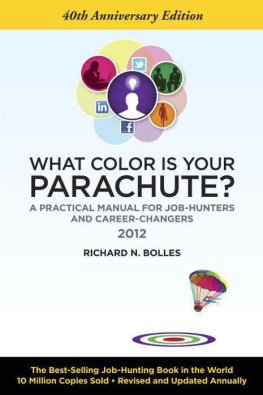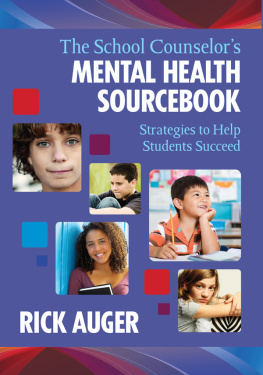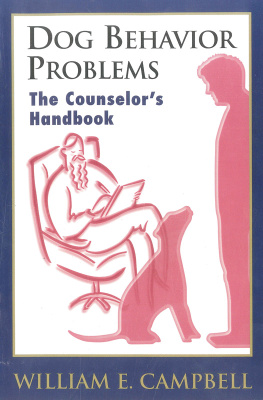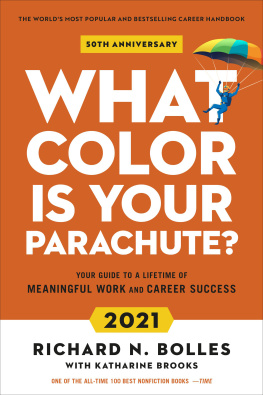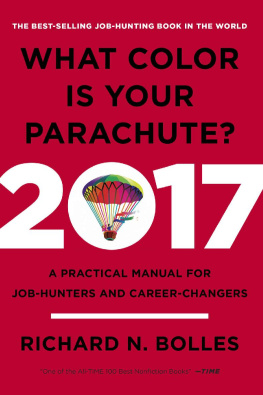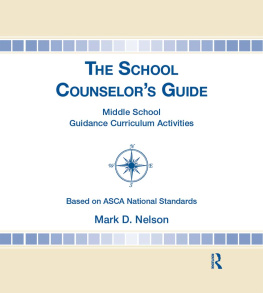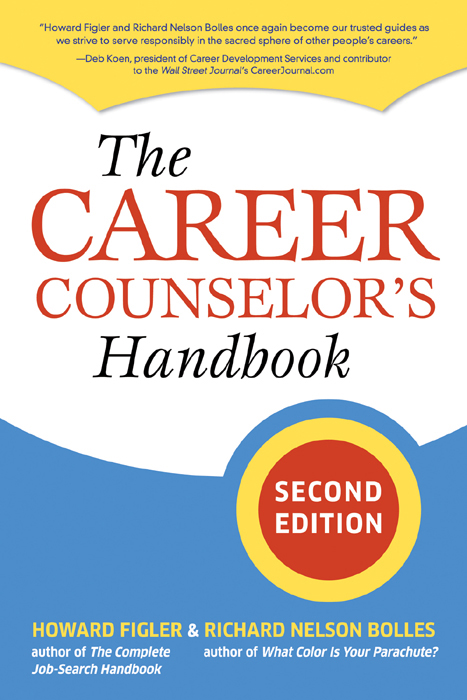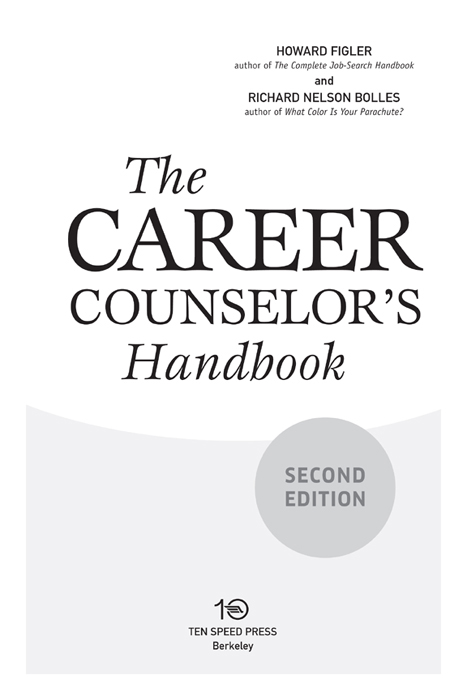Copyright 1999, 2007 by Howard Figler and Richard Bolles
All rights reserved. Published in the United States by Ten Speed Press, an imprint of the Crown Publishing Group, a division of Random House, Inc., New York.
www.crownpublishing.com
www.tenspeed.com
Ten Speed Press and the Ten Speed Press colophon are registered trademarks of Random House, Inc.
Many of the designations used by manufacturers and sellers to distinguish their products are claimed as trademarks. Where the publisher is aware of a trademark claim, such designations, in this book, have initial capital letters.
Library of Congress Cataloging-in-Publication Data
Figler, Howard E.
The career counselors handbook / by Howard Figler and Richard N. Bolles. 2nd ed.
p. cm.
Includes index.
1. Career development. 2. Vocational guidance. 3. Counseling. I. Bolles, Richard Nelson. II. Title.
HF5549.5.C35F54 2007
331.702dc22
2007011597
eISBN: 978-1-60774-355-2
v3.1
Acknowledgments
Authors rarely toil alone. When they are at their best, they toil as part of a community. We, the nominal authors of this book, are deeply aware of the community out of which this book has risen. For it will be evident to all who know us that we could not have come up with all these ideas simply on our own. We acknowledge the help we received from many career counselors, in person, on the phone, or by correspondence, wherein they shared with us their insights, their problems, and their inventive solutions. They made this book possible, and by their gentle prodding, they brought this book to fruitionafter we had merely talked about writing it for many years.
We offer especially warm thanks to Dick Knowdell, in whose Career Planning and Adult Development Network Newsletter many of these chapters and ideas first appeared, albeit in a more primitive form, more often than not. These include A History of Ideas and Events in the Job-Hunting Field during the Twentieth Century, How to Do 1-2-3 Career Counseling, How to Use Just One Hour, A Return to the Real America, Schooling and Entrepreneuring, Five Business Cards Instead of One, Helping Clients Define Success, Doing Well and Doing Good, and Adding Value.
We would like to express our gratitude to our editor, Lisa Westmoreland, for the many ways she helped us with numerous insightful suggestions.
Howard would like to express his thanks also to Betsy Collard, H. B. Gelatt, Marcia Harris, Janice Klar, Deb Koen, John Krumboltz, Constance Stevens, Helen Scully, Patrick Ferris, Adrienne Webb, and Kathy Strawser-Worgul.
And Dick would like to acknowledge his debt to Daniel Porot, the late John Crystal, the late Sidney Fine, Dick Lathrop, Harvey Belitsky, Arthur Miller, Tom Jackson, Ellen Wallach, Rita Morin, Dave Swanson, and Carol Christen.
Needless to say, however, none of them are responsible for any errors that may have crept into this book, despite our most vigilant effort to keep those errors out.
Howard Figler
Dick Bolles
Contents
Preface
Howard Figler and I have been friends for over twenty years. We live near each other, see each other often, and have worked together (we used to appear every November at the California Career Conference/International Career Development Conference, and, in addition, Howard was on staff at my two-week workshop, which was held each August in Bend, Oregon).
One day we were discussing a lamentable lack in this field: namely, the need for a comprehensive handbook that could be given both to seasoned career counselors who were seeking to reinvigorate their passion for what they do and to those just seeking entry into the field.
After discussing whom we should recruit to write such a handbook, we decided to do it ourselves. We chose topics, assigned or volunteered for this chapter or that, and set to work. Howard did all the prodding (lets get this done!), the setting of time lines, and so forth. This has been true of this edition as well.
We made no effort to enforce consistency on the way this work is written. Not only are our writing styles quite different, but there is no consistency even within our own bodies of work. So we let the material shape the style of each chapter, rather than search for the Holy Grail of uniformity. Thus, these chapters vary widely in organization, arrangement, and style.
Fortunately, in thought and viewpoint Howard and I are almost one. I have commented for years that I search his writings in vain to find something I really substantially take issue with. And so says he. (And so say we all.)
As you approach this book, think of it as mining for gold (in the old Gold Rush days). Back then you found a promising spot and got shovelfuls of dirt, which you ran through a sluice pan in some stream, looking for nuggets of gold. Since Howard and I both live in California, we like this metaphor. It states our wish for you, dear reader: may you find some nuggets, as you go!
Dick Bolles
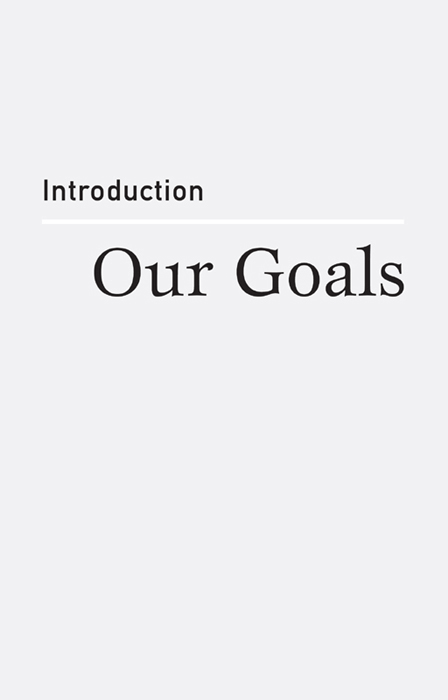

So Youre a Career Counselor!
Just Exactly What Do You Do?
by Dick Bolles
It would be nice if all of us who try to help people with their job choice and their job-hunt could say we basically do the same thing.
But happily (or unhappily) career counseling is a very broad field. To understand how broad, consider just some of the job-titles that belong to this field: vocational psychologist, employment counselor, life/work planner, guidance counselor, vocational-rehabilitation (or voc-rehab) counselor, job-developer, executive search professional, outplacement specialist, placement director, career counselor, counseling director, vocational counselor, counseling psychologist, test administrator, manpower expert, and career coachand they keep going, on and on. Yikes!
One way to simplify it, a bit, is to disregard job-titles and simply consider what it is a person does in this field. Turns out there are basically seven subjects that we may occupy ourselves with in career counseling:
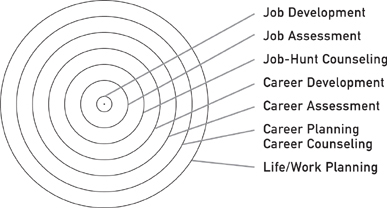
If we want to simplify it still further, we can ask whether in our work we are:
Primarily (not exclusively, but primarily) occupied with the job-market, and whats out there; or,
Primarily (not exclusively, but primarily) occupied with the individual, and whats in there; or,
Equally occupied with both job-market information and the individuals needs.
Alternatively, we can describe what we do in this field by identifying what we see as our primary goal:
1. Is our goal primarily to dispense information? or
2. Is our goal primarily to impart knowledge? or
3. Is our goal primarily to share wisdom?
Since these last three questions are rarely discussed, I think it is tremendously helpful to discuss them here and see how we become expert in any one of these, regardless of which goal we pick.


